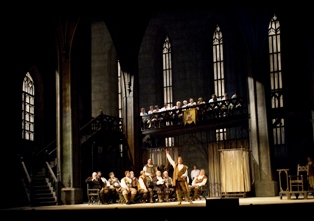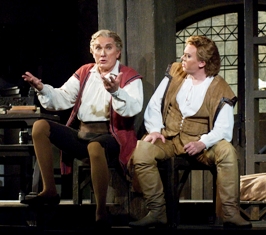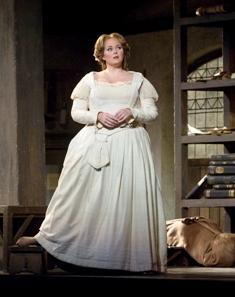
Wagner Returns to Music Hall
Cincinnati Opera’s “Die Meistersinger von Nürnberg” ended
just before midnight Wednesday, conjuring visions of Cinderella rushing home
from the ball.

No need for that. This “Meistersinger” did not crumble into packing crates or a figment of artistic director Evans Mirageas’ imagination (no pun intended).
There was no need to look for a glass slipper either, for this stunning production returns at 6 p.m. Saturday at Music Hall.
Set in the period, i.e. 16th-century Nuremberg, and designed by Günther Schneider-Siemssen, it was all fairy tales and Old Master paintings, with huge Gothic arches in the church scene, a street scene right out of the Brothers’ Grimm, and a two-story workshop for Hans Sachs. (The set is so heavy the Opera tested it onstage in March, when it arrived from Düsseldorf, Germany, where it was purchased for a bargain price.) Cincinnati Opera’s Thomas Hase glorified it, as always, with his magical lighting.
German stage director Chris Alexander applied a master's touch to the goings-on onstage, which were as vibrant and engaging as this reviewer has ever witnessed. Despite the infamous "long" moments in Wagner, Alexander and the cast found myriad ways to keep the listener keenly attentive.
Oddly enough, the performance took place on Midsummer’s Eve (June 23, the eve of St. John’s Day), as does the opera, in which the lovers’ only prospect of living “happily ever after” depends on the suitor’s success in a song contest.
Centerpiece of Cincinnati Opera’s 90th anniversary season, Wagner’s comic masterpiece seemed bedeviled from the start. The original concept, a “Meistersinger” updated to 19th-century Over-the-Rhine, fell victim to the recession last fall. Star conductor James Levine canceled in April to undergo back surgery and most of the cast followed him for one reason or another.
In their place, Mirageas, one of the most well-connected
people in the opera world, assembled a virtual dream team, headed by conductor
John Keenan, Levine’s assistant at the Metropolitan Opera in New York. Keenan led with both passion and control,
drawing a remarkably polished performance, not only from the Cincinnati
Symphony Orchestra, but the entire cast of 17 -- 11 of whom, including all of
the major roles, were making their Cincinnati Opera debuts. In that sense, it was, in fact, a kind of "Cinderella" production.
Bass-baritone James Johnson filled the shoes of Hans Sachs,
the wise old cobber/Mastersinger who is the crux of the story, with great
distinction. Johnsons’s warm, focused tone, enveloping smile and modest, but authoritative manner inhabited his
character completely.

Sachs is a multi-dimensional character: a widower who loves Eva Pogner and could easily win her in the upcoming song contest, but defers to youth and helps the man she really loves craft his prize song instead. Sachs is a poet and a philosopher who muses about life in the great act three monologue, "Wahn! Wahn! Überall Wahn!" ("Folly, everywhere folly"). And he is an advocate for art, including adventurous art, wherein he personifies Wagner himself. Johnson cobbled in time, too, when Sachs "accompanies" Beckmesser's Serenade in act two with strokes of his hammer.
Soprano Twyla
Robinson as Eva, whose father has promised her to the winner of the song
contest, was demure one moment, assertive the next, but always bewitchingly
feminine, even giggly in act one, where she tripped daintily off the stage
after her rendezvous with Walther in the church.

Tenor John Horton Murray exuded ardor and dignity as Eva's beloved, Walther von Stolzing, the aristocrat who must negotiate the ways of the craftsmen to win his bride. He displayed a ringing heldentenor, wisely saving its full force for his winning master song at the end.
Bass Hans-Joachim Ketelsen nearly stole the show as Beckmesser, the rule-bound town clerk (foil for the critics of Wagner's day), who competes for Eva, only to court disaster. “Nearly” because this was a well-matched ensemble cast, where each singer complemented the others and everyone shone. Still, it would be hard to top Ketelsen’s agile singing and comically limber acting. He could hobble painfully one moment, as when he entered Sachs' shop the morning after the act two street brawl, and whirl about with glee the next, when Sachs gave him the song he had already stolen from Sachs' work bench.
Another standout was tenor Norbert Ernst as Sachs’ apprentice David (Ernst goes from Cincinnati to Bayreuth to sing the same role at the Wagner Festival there). His bright, almost impish voice and lively acting delightfully captured the young apprentice who yearns to become a journeyman so he can wed Eva’s nurse Magdalena. Mezzo-soprano Maria Zifchak as “Lene” displayed both a plummy voice and real comedic flair.
The Mastersingers were a formidable group, comprising bass Johann Tilli as Eva's father Veit Pogner, tenor John Christopher Adams as Vogelgesang (a sterling Lenny in Carlisle Floyd’s “Of Mice and Men” at the University of Cincinnati College-Conservatory of Music in May), bass-baritone/UC faculty artist William McGraw as Nachtigall, bass-baritone John del Carlo as Kothner, baritone Thomas Hammons as Ortel, tenor David Ekström as Zorn, tenor Ric Furman as Moser, tenor Brendan Tuohy as Eisslinger, bass LeRoy Lehr as Foltz and bass David Michael as Schwarz. These guys can sing, and they made a handsome group as they processed up the aisles of Music Hall to the stage in the last act.
Morris Robinson, the uniquely voiced bass who transfixed Cincinnati Opera's June 19 gala concert with “His Eye is on the Sparrow,” made a commanding cameo appearance as the Night Watchman in act two (pure luxury casting).
The Cincinnati Opera Chorus did yeomen's (and women’s) work as the townspeople of Nuremberg, whether frolicking in the streets or engaging in one of the most hilarious dustups you will ever see in act two. They leaned out of windows, climbed rooftops, wrestled, punched and otherwise created bedlam following Beckmesser’s riotous serenade beneath Eva’s window. In the final act, they were joined from the right and left galleries of Music Hall by an augmented chorus, largely from the May Festival, which created an awesome surround-sound effect.
The CSO was in full force and fine fettle in the pit, with
over 70 players (extra trumpets performed onstage during the finale). Principal harpist Gillian Benet Sella did
double duty on both concert and troubadour harp, where she played her own
starring role as Beckmesser’s lute. The
CSO is the Opera’s greatest asset, able to master the most difficult score in
the chronically few rehearsals allotted to Cincinnati Opera productions. (Wednesday’s performance was, in fact, the
first time the orchestra had performed the work straight through.) Rarely do the first and second violins (anywhere) nail their
high A in tune together in the Prelude to the opera, but they did so here. As for character, it would be hard to match
the trombone’s mortified tone in act three when Beckmesser accidentally sat down on a hammer in
Sachs' workshop, or the gorgeous cello solos in the act one church scene.
The evening brought a substantial audience to Music Hall for the six-hour event, which included two lengthy intermissions so that patrons could enjoy sandwiches and beverages in the lobby (unfortunately there were no sandwiches left by the second intermission, though German Springerle cookies were still available at $3 each). Parking was as much as $10 in the vicinity (double the usual cost) but it all seemed worth it for the Opera’s welcome return to the German repertoire after a sketchy half-century. There was some attrition as the evening wore on, but the roar of approval that went up as the curtain fell spoke volumes for the richness of the experience and the delight of those who went the distance.
Sung in German, with English supertitles, the opera repeats at 6 p.m. Saturday at Music Hall. Tickets ($35-$212) are available at the Opera web site www.cincinnatiopera.org and by calling (513) 241-2742.